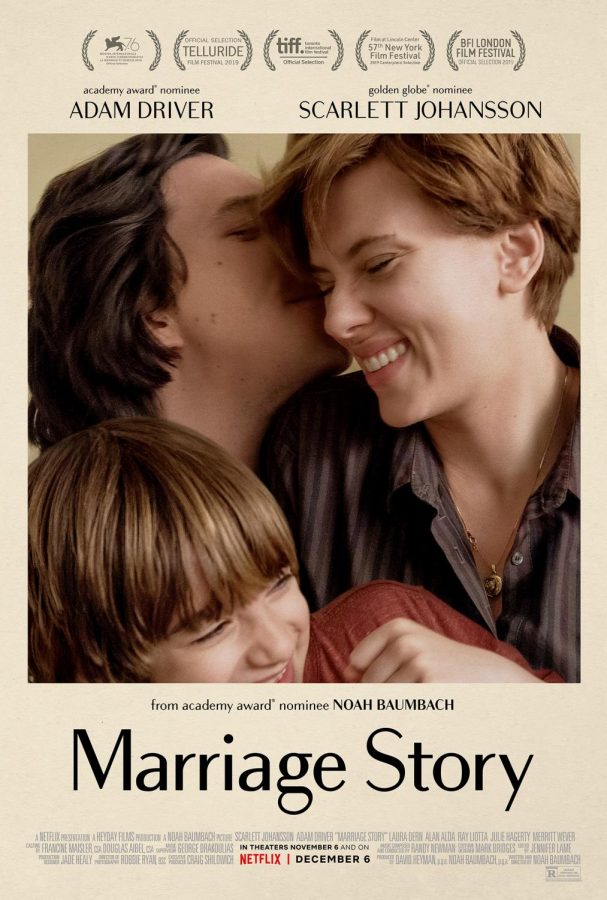Review: “Marriage Story” is the love letter to the end of love
February 5, 2020
“Marriage Story” is a heart-wrenching end to a love story that makes the audience feel like there is no winning side by taking a distinct look at what the two main characters are thinking.
The movie opens with Nicole, played by Scarlett Johansson, and Charlie, played by Adam Driver, reading out lists of what they love about each other. It then cuts to the two of them sitting in the office of a mediator, refusing to read their lists aloud before starting the process of their divorce.
This is where the audience is introduced to the main conflict of the story. Charlie and Nicole, who had fallen in love after Nicole starred in one of Charlie’s plays, are going through a divorce as Nicole moves to Los Angeles with their son, Henry, to start a new career. Originally, they wanted to do the divorce without lawyers. However, when Nicole gets to Los Angeles, she is referred to Laura Dern’s Nora, a fierce family lawyer who motivates Nicole to take legal action against Charlie.
“Marriage Story” does a wonderful job at telling a modern-day love story. One where love loses, not because of violence or infidelity, but because of growth. The reason that Nicole wanted to leave was because she felt like she had never actually known herself. She had always felt like she lived in Charlie’s shadow. That being said, the story doesn’t antagonize Charlie. Instead, the audience learns to hate the process of losing love over anything else.
Perhaps the most stand-out aspect of the film, however, is the performance of the cast. Driver and Johansson both give raw performances. Driver is unafraid to process all sorts of emotions in the film, which provides a stark contrast to his performance in the “Star Wars” franchise. Meanwhile, Johansson balances the very difficult line of portraying a guarded versus an emotionless character. For a large portion of the film, she acts stoic around the subject of their divorce, making the point when she breaks much more powerful.
The best performance by far was Laura Dern’s Nora. Within seconds, the character flips from a ruthless lawyer into a near-friend. The absurdity of this switch grows increasingly noticeable as the movie goes on but is never seen as too much. Dern does this in such a manner that, where there is potential for this to come across as too much, it never feels any less than authentic.
Editor’s Note: The following paragraphs contain spoilers for “Marriage Story.”
After all that praise, there are a few points of contention to be had with the film, all of them relating to interruptions of the flow of the story.
The first example is regarding the plot point of Charlie’s affair. Nicole mentions that she suspects he slept with one of his crew members. He confirms it in a different scene, and it is not referenced in-depth again. For something that had potential to come back during the trial, it instead appeared to be thrown away.
Next is a scene where Charlie accidentally cuts his arm. This scene, that happens toward the end of the movie, is a very different and much more graphic scene and does not flow well with everything else that had happened. After it does happen, it is not resolved. The audience sees him bleeding on the floor, and then he is completely healed and back in New York.
Finally, there is the song. The song is a musical number that Charlie sings towards the end of the film. It is not a bad song, per say, but it does not make any sense. “Marriage Story” is not a musical. At no other point does a character break into song. While, yes, Charlie does work in theater and the song could be explained by that, the moment felt extremely forced.
However, the ending of the film does an excellent job of tying everything back together. Charlie finds the list that Nicole read in the beginning of the film, and reads it aloud to Henry. In doing this, the movie tells the audience that while love may fade, it is never lost, proving a bittersweet conclusion.
“Marriage Story” as a whole is driven by the cast, who gave remarkable performances that turned a generally well-written story into something note worthy.








